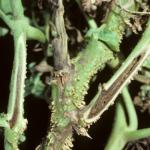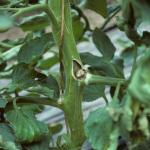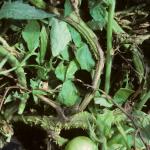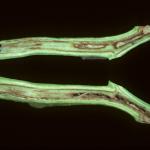Tomato, Pith Necrosis
Pseudomonas corrugata
Tomato pith necrosis is caused by Pseudomonas corrugata and other soil-borne species of Pseudomonas. While high tunnels provide ideal conditions for the growth of early season tomatoes, this environment and traditional greenhouses also provide ideal conditions for a newly emerging disease of greenhouse tomatoes. This disease generally occurs on early planted tomatoes growing when night temperatures are cool, the humidity is high, and the plants are growing vigorously because of excessive levels of nitrogen. The disease is also associated with prolonged periods of cloudy, cool weather.
Identification:
Initial symptoms often appear just as the first fruit clusters reach the mature green stage and consist of yellowing and wilting of young leaves. Serious infections can result in chlorosis and wilting of upper portions of plants with brown to black lesions on infected stems and petioles. When stems are cut longitudinally, the center of the stem (pith) may be extensively discolored, hollow, and/or degraded. Stems may be swollen, numerous adventitious roots can form, and infected stems may shrink, crack, or collapse.
Life Cycle:
The epidemiology of this disease is not well understood; it is possible that the bacteria are seed-borne and most certainly survive in the soil in association with infected tomato debris.
Cultural Controls & Prevention:
Preventive measures to minimize the occurrence of this disease in high tunnels include: adequate ventilation to avoid high humidity levels (especially during cloudy weather), avoiding excessive nitrogen levels to prevent vigorous plant growth, incorporation of crop debris to speed decomposition of residue and associated bacteria, and crop rotation.
Chemical Controls & Pesticides:
There is no effective treatment for this disease; however, affected plants may recover if environmental conditions improve (warm, sunny weather).
Crops that are affected by this disease:
The Center for Agriculture, Food and the Environment and UMass Extension are equal opportunity providers and employers, United States Department of Agriculture cooperating. Contact your local Extension office for information on disability accommodations. Contact the State Center Director’s Office if you have concerns related to discrimination, 413-545-4800 or see ag.umass.edu/civil-rights-information.



